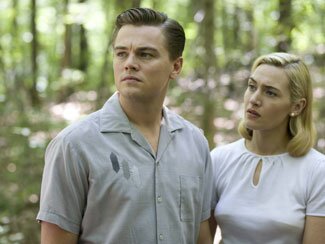MOVIE REVIEW- A Marriage: From perfect match to cage match

If enough young people see Revolutionary Road, the marriage rate should drop significantly. It could even inspire Constitutional amendments to defend the sanctity of marriage by forbidding heterosexuals to engage in it.
On the other hand, if you're already married, this movie will make you see that the problems in your relationship aren't as bad as you think, or at least that they could be worse.
Revolutionary Road is the story of one marriage that goes south, while a couple of others in the background don't look ideal either. The difference is that the other couples have resigned themselves to their lot, while the Wheelers are still fighting against reality and each other.
It begins in the late 1940s when Frank Wheeler (Leonardo DiCaprio) and April (Kate Winslet), two swell kids with their whole lives in front of them, meet and fall in love.
Cut to 1955. Can this marriage be saved? Should it? Could they ever have loved each other? April gave up her dreams of becoming an actress to take care of their modest suburban home on Revolutionary Road and raise their two kids. Frank is commuting to a job he hates with the same company his father worked for.
It's a life of "hopeless emptiness," occasionally relieved for Frank by getting out of his cubicle for an afternoon tryst with a girl from the secretarial pool (Zoe Kazan). April tries acting in a community theater production at the local high school, but it doesn't go well.
A woman of unpredictable moods, April comes up with a plan for "our one chance": they'll chuck it all and move to Paris. She can get a good job as a secretary, and Frank will have time to find out what he wants to be.
The idea draws a variety of reactions from the other people in their lives, most of whom are at least somewhat jealous. There are Frank's co-workers, notably the flamboyant Jack (Dylan Baker); next-door neighbors Milly (Kathryn Hahn) and Shep Campbell (David Harbour) (Shep has a yen for April); and their realtor, Helen Givings (Kathy Bates), her husband Howard (Richard Easton) and their son John (Michael Shannon), who describes himself as "a certified lunatic." Being insane (he's not kidding), John is the only one not afraid to speak the truth, which makes him the movie's voice of sanity.
Two potential roadblocks arise during the summer before the Wheelers are scheduled to leave. Frank accidentally impresses a higher-up in the company (Jay O. Sanders), who offers him a much better job that might actually be interesting. April becomes pregnant again, although she's willing– nay, eager– to abort the child.
Their lives, which had been going in separate directions, are suddenly on a collision course. In her bad moods April has gone from indifference toward Frank to outright loathing.
There may be a gender gap among viewers. While neither partner is totally blameless, I can't imagine anyone finding April the more sympathetic spouse, but women might feel the same way about Frank. At least he gets to dip into the secretarial pool for relief while April's stuck in the house (although considering how young their children are, they don't seem to be around much).
The source novel by Richard Yates was published in 1961, when it was timely rather than nostalgic. The period setting (somewhat overdone, as in shots of hordes of hat-wearing commuters) allows director Sam Mendes to combine the scathing take on Suburbia of his American Beauty with the sexism, smoking, and other attributes of the era that make Mad Men so popular.
DiCaprio and Winslet, who haven't been together since the Titanic sank, pick up where they left off and give impeccable, older and wiser performances. Shannon is the subject of much award speculation but he's a bit over-the-top for my taste. On the other hand, I enjoyed Bates in a relatively subdued mode.
It's a bit annoying when a movie is as smugly, self-consciously good as Revolutionary Road. If such things are possible, why does so much crap come out of Hollywood the rest of the year?
#